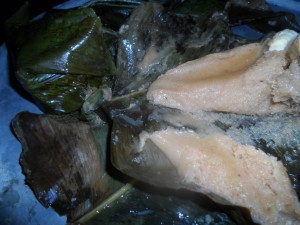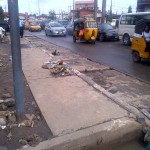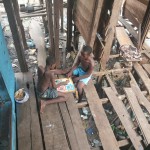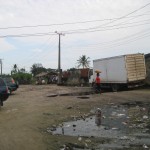Ìmọ́tótó borí àrùn mọlẹ̀, bọ́yẹ́ ti ḿborí ooru
Àrùn ìwọ̀sí tinú ẹ̀gbin là wá
Iná ni ḿborí aṣọ ẹlẹ́gbin
Ni ayé àtijọ́ tàbi, lati bi agogo marun idaji ni ìmọ́tótó ti bẹ̀rẹ̀, nipa gbigbá inú àti àyiká ilé. Lẹhin eyi, àwọn àgbàlagbà á ṣe itọ́jú ara, wọn o si bójú tó bi àwọn ọmọ ilé-iwé yio ti ji, wẹ̀, múra, jẹun àti palẹ̀mọ́ àti kúrò ni ilé lọ si ilé-iwé àti ki àwọn àgbàlagbà lọ si ibi iṣẹ́ òòjọ́.
Pàǹtí ni àtijọ́ wúlò fún ajílẹ̀ nitori ara oúnjẹ ni. Ewé ni wọn fi ńpọ́n oúnjẹ tàbi ki wọn bu oúnjẹ sinú abọ́ àlò-tún-lò, omi wa ninú àmù (ikòkò amọ̀), ṣùgbọ́n láyé òde òni, ike aláyọ́ ni wọn fi ńbu oúnjẹ, wọn a si mu omi ninú àpò ọ̀rá. Ike àti ọ̀rá ki kẹ̀, ó si léwu fún ẹja odòàti ẹranko lati gbé mi, ó tún léwu fún àyìká. Àwọn ọ̀rá àti ike wọnyi pẹ̀lú nkan ti ó dá kún pàǹtí.
Ìmọ́tótó jinà si àwọn ara ilú ńlá, pàtàki, ilú Èkó nibiti ọpọ òṣiṣẹ́ ti ji jade lọ si ibi iṣẹ́ ki agogo marun idaji tó lù, bẹni wọn kò ni wọlé titi di agogo mẹwa alẹ́ nitori sún-kẹrẹ fà kẹrẹ ọkọ̀. Eyi kò lè jẹ ki wọn ri àyè tọ́jú inú ilé, àyiká tàbi ara. Ìjọba tún dá kún ẹ̀gbin ti ó gba ilú kan nitori ai pèsè àyè àti itọ́jú fún pàǹtí. Eleyi ńjẹ́ ki ará ilú kó ohun ẹ́gbin si ibikibi, bi oju-àgbàrá, ẹ̀bá-ọ̀nà, ori titi, inú odò àti bẹ̃bẹ̃ lọ. Kikó ohun ẹ̀gbin di ojú-àgbàrá ńfa adágún omi ti ó ńfa ẹ̀fọn, ikún omi àti àrùn lati ara kòkòrò ti pàǹtí fa.
- Pàǹtí oju-àgbàra – Refuse dumped in open drainage. Courtesy: @theyorubablog
- Ẹ̀gbin inú odo – Dumped refuse on the Lagos Lagoon. Courtesy: @theyorubablog
- Pàǹtí oju-ọ̀nà – Refuse on the Road. Courtesy: @theyorubablog
Ọ̀rọ̀ Yorùbá ni “Ìmọ́tótó borí àrùn mọ́lẹ̀, bi ọyẹ́ ti ḿborí ooru” àti orin Ìmọ́tótó ti wọn fi ńkọ́ àwon ọmọ ilé-iwé alakọbẹrẹ ṣe iranti à ti wá nkan ṣe si pàǹtí ti ó gba ilú kan.
ENGLISH TRANSLATION
In the olden days, cleanliness began at about five o’clock at dawn, by sweeping in and around the house. After this, the elders took care of their bodies, supervised the school children, to wake-up on time, take their bath, dress-up, eat and prepare to leave home to School while the elders go to find their daily bread.
Refuse in the olden days are biodegradable because it is mostly made up of edibles that turns into manure. Leaf is used to wrap food or food are served in recyclable dish, drinking water are preserved with earthen pot, but nowadays, food are served in plastics while they drink from plastic or water sachet. Both plastics and plastic water sachet are non-biodegradable as they are dangerous for river/sea fishes and animals to swallow and they are bad for the environment. These plastic containers have contributed to the amount of waste.
Cleanliness is far from big city dwellers, particularly, in Lagos where many workers rush out at about five o’clock early in the morning and would not return till ten o’clock at night as a result of heavy traffic. This does not afford City dwellers enough time to care for the home, environment or their body. The Government has also contributed to the filth/refuse that has taken over many cities as a result of not providing enough dumpsite and waste treatment. This has made people dump refuse just anywhere such as drainages, roadside, on the road, river or sea etc. Disposing refuse into drainage causes water stagnation that breeds mosquitoes, flood and diseases caused by insects that breeds on refuse.
People should use the Yoruba adage that said “Cleanliness conquers disease just as cold (harmattan) overcomes the heat” and various songs about cleanliness taught to School children as a reminder to taking action to reduce refuse littering every corner.
Originally posted 2014-10-21 09:25:00. Republished by Blog Post Promoter






